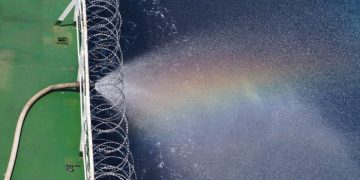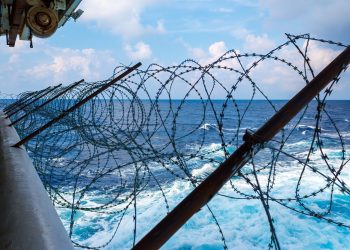The American P&I Club shared best practices aiming to reduce the number of breakaways and other incidents from barge fleeting areas within the river systems of the US.
Barge fleeting areas are important to maritime commerce, particularly on US rivers, as they provide secure places to temporarily store loaded and empty barges. The barges may be waiting for a towboat to pick them up, waiting to be cleaned, waiting for repairs, or waiting for a ship to arrive so they can be offloaded. The new guidance addresses the unique risks associated with fleeting operations, as well as the regulations which apply, to them, and outlines the best practices to follow when interacting with barge fleeting areas.
Barge fleeting areas risks
- If the barges are not properly secured and monitored, they can be damaged, cause third-party property damage, or fail to protect the cargo within.
- If not properly cared for, the hull or barge covers may allow the ingress of water.
- If the weather and/or river current is not sufficiently accounted for, barges can break loose.
- If the moorings at the fleeting area are not properly maintained, barges can also break loose.
Best practices when interacting with a barge fleeting area
A. The barge fleeting area should have clear procedures and policies for both barge arrivals and departures that specify minimum expectations and requirements as far as the barge’s physical condition and the condition of mooring ropes and wires. The policies should clearly state whether or not personnel representing the barge fleeting area are to be present for operations where barges are dropped off, moved or picked up. The towing company and the towboat Master should understand the barge fleeting area procedures and policies before dropping off or picking up a barge or barges.
[smlsubform prepend=”GET THE SAFETY4SEA IN YOUR INBOX!” showname=false emailtxt=”” emailholder=”Enter your email address” showsubmit=true submittxt=”Submit” jsthanks=false thankyou=”Thank you for subscribing to our mailing list”]
B. The barge fleeting area will also have requirements for inspecting barges including inspecting the barge’s cavels. Their standards for line quality for the lines left behind to secure the barge should be clearly spelled out. In addition, the watertight integrity of the barges should be inspected. Barges with excessive leaks may not be allowed into the barge fleeting area. Although different barge fleeting areas may have different standards, a barge that, for example, might require constant attention by fleeting area personnel, or a barge that requires a pump to run continuously, may not be allowed in.
C. Additionally, the barge fleeting area must operate within the limits of their fleeting area permit. This may limit the number of barges and/or the configuration of the barges in the fleeting area. Operators should be aware of those limits before dropping of a barge or barges.
D. The barge fleeting area is also required to have a high water plan that addresses:
- When extra lines are required to connect the barges to the moorings.
- When extra lines are required between barges.
- If and when wires might be required instead of rope.
- When fleeting operations should be stopped so personnel can secure barges.
- And, most importantly, when the mooring configuration of the barges in the fleet should be changed to the least vulnerable arrangement. The high-water plan may limit the ability to drop off or pick up barges and, if permitted, will most likely change the mooring configuration for a barge.
E. Operators should anticipate that the barge fleeting area will be checked frequently at established intervals. Checks will likely include:
- The condition of the wire ropes and lines used to secure the barges to the moorings and to secure barges to each other to verify the wire ropes and lines have not broken, become frayed, become loose, or caused any deformation to rings, timberheads, cavels, spools, etc.
- Whether the mooring arrangements need to be adjusted to tighten or slack wire ropes and lines due to changing river levels.
- The status of barges with known leaks including the status of any pumps in operation.
- The lighting on the barges.
F. While the operator of the barge fleeting area, the watchmen in the fleeting area and the crew on the fleet towboat should have a keen awareness of the river conditions, the weather and forecasts for each: do not assume they do. Keep current conditions and forecasts in mind when mooring a barge or barges and use sufficient wire ropes and lines in anticipation of expected conditions.
G. Communications equipment should be available to the watchmen and other personnel operating in the fleeting area to allow them to communicate with towboats.
H. Emergency equipment should be available in the barge fleeting area including pumps, damage control equipment, hoses, rigging, and oil spill response gear. However, it should not be expected that the barge fleeting area to be able to sufficiently mitigate all risks associated with barges that are in poor condition or moored improperly.
I. Participation in local Harbor Safety Committees (HSC), Fleeting Associations, or similar groups can provide insight and be platforms to address common problems and share ideas, which is highly recommended. The US Coast Guard and US Army Corps of Engineers normally participate in those groups.




























































